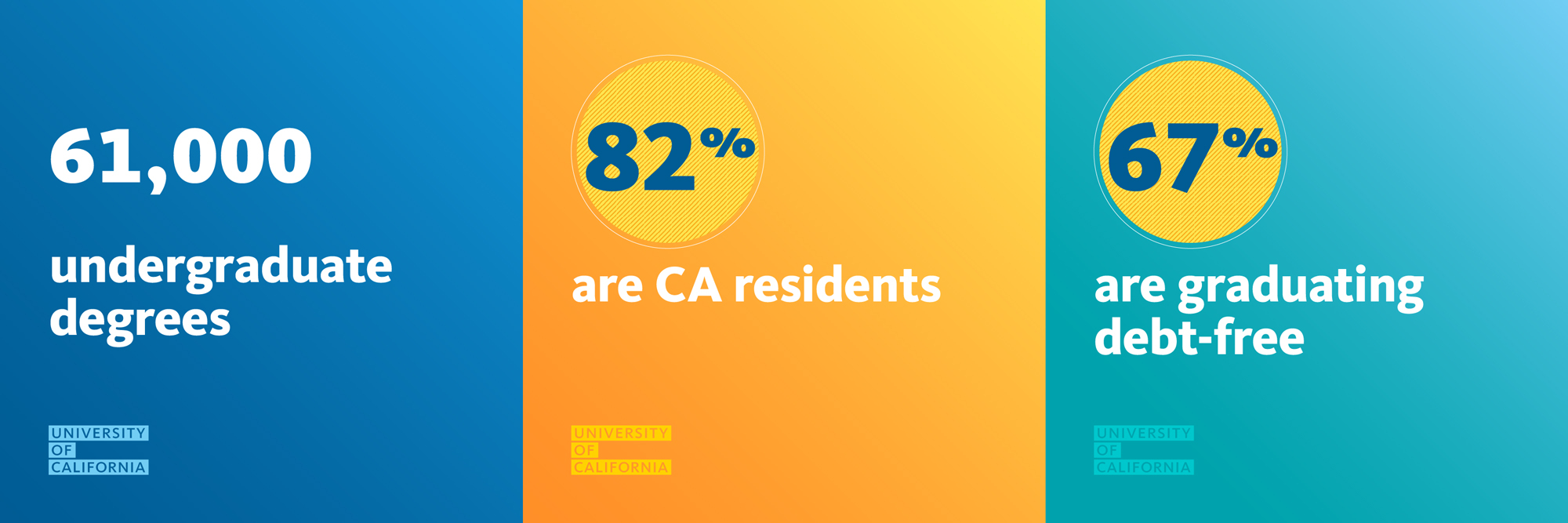Apollonia Morrill, UC Newsroom

Here’s a stat that might surprise you: More than two-thirds of the 61,000 students earning bachelor’s degrees from the University of California this spring will graduate with no student debt: Zip, zero, zilch.
“I was very nervous about paying for college,” says Yesenia Pérez, who is graduating from UC Santa Barbara this spring and going on to a fully funded UC master’s program in technology management. “Seeing all the tuition and fees and housing costs was intimidating. I thought I would have to pay for a majority of it, but that hasn’t been the case for me. My costs were fully covered by financial aid, and I’m graduating without any debt.”

Amid a national debate about whether college is still worth it, the data about UC alums is unequivocal: Not only do large percentages of UC alums enter the workforce with no student debt, but their degrees often deliver an array of benefits both for themselves and their communities — including higher lifetime earnings and an increased likelihood of owning a home or starting a business, compared to peers without a degree.

For the roughly 40 percent of UC’s undergraduates in the Class of 2025 who come from low-income families, those hard-won degrees are even more of a game-changer: Within five years of graduating, a majority of UC’s low-income graduates earn more than their families. And within 10 years, they see their incomes double.
Pamela Brown, UC’s vice president of Institutional Research and Academic Planning, whose team tracks the data, calls a UC degree “a great equalizer” for its power in moving lower-income alums into the same economic sphere as their more affluent peers.
In the Class of 2025, more than 25,000 new bachelor-degree holders come from low-income households and are likely to benefit from that upward trajectory. The advantages of economic mobility ripple out beyond individual grads, lifting up their families and boosting communities across the state.
Low-income student Nick Casis graduated from UC Irvine debt-free in 2024 and is now working for the City of Torrance in Section 8 and affordable housing. His undergraduate experience shaped his career aspirations in social welfare and urban planning. As he puts it, “Having access to all of these amazing resources as a UC student and then being able to go out and improve things for our families and ourselves, I think that's just a quintessential part of the UC experience.”
UC alums serve communities across California
The undergraduate Class of 2025 is a testament to UC’s strength as an agent of social and economic mobility. Of these students, 30 percent transferred from a California community college, 38 percent are among the first generation in their families to attend a 4-year college or university, and 40 percent were eligible for Pell Grants, the federal aid program for low-income students.
The benefits go well beyond the students themselves — California gains plenty from these newly minted degrees. California’s workforce absorbs waves of highly educated doers, ready to shape the state’s collective future in every field and industry imaginable. Health care, education, law, computing, engineering and public administration are among the most common fields for UC alumni working in California.
Roughly 40 percent of UC bachelor’s degree-holders will go on to earn advanced or professional degrees, helping California sustain its standing as an economic heavyweight and a global engine of innovation.
Filling the need for educators and medical professionals across California
For the 23,000 UC students finishing their master’s, doctoral and professional programs this year, the benefits of a degree are amplified. They have higher long-term earnings and gain the skills necessary for specialized industries like law, health care, and education. Once they complete their degrees, 28 percent of UC academic doctoral and master’s graduates who stay in California go on to work in higher education, helping more Californians rise as earners and leaders in the state’s workforce.
With an urgent and growing shortage of physicians in California and across the country — including internists, pediatricians, psychiatrists and OB/GYNs — UC-trained doctors are stepping up to meet the demand. Almost 70 percent of UC-trained physicians stay in California, and more than 50 percent work in a specialty where the state faces a workforce shortage. What’s more, they often serve the regions where they are needed most, such as the Central Valley, Inland Empire and rural Northern California. UC awards nearly 40 percent of California’s health care degrees, with UC-trained doctors and nurses bringing life-changing care to patients up and down the state.
Among this year’s graduating class is Bridget Gramkowski, who will earn a doctorate in nursing practice from UC San Francisco that has improved her ability to teach the next generation of nurses. “I love teaching nursing. It's a great honor and privilege, and really fun, to have taught so many students who then go out and serve as nurses and change lives,” says Gramkowski.

